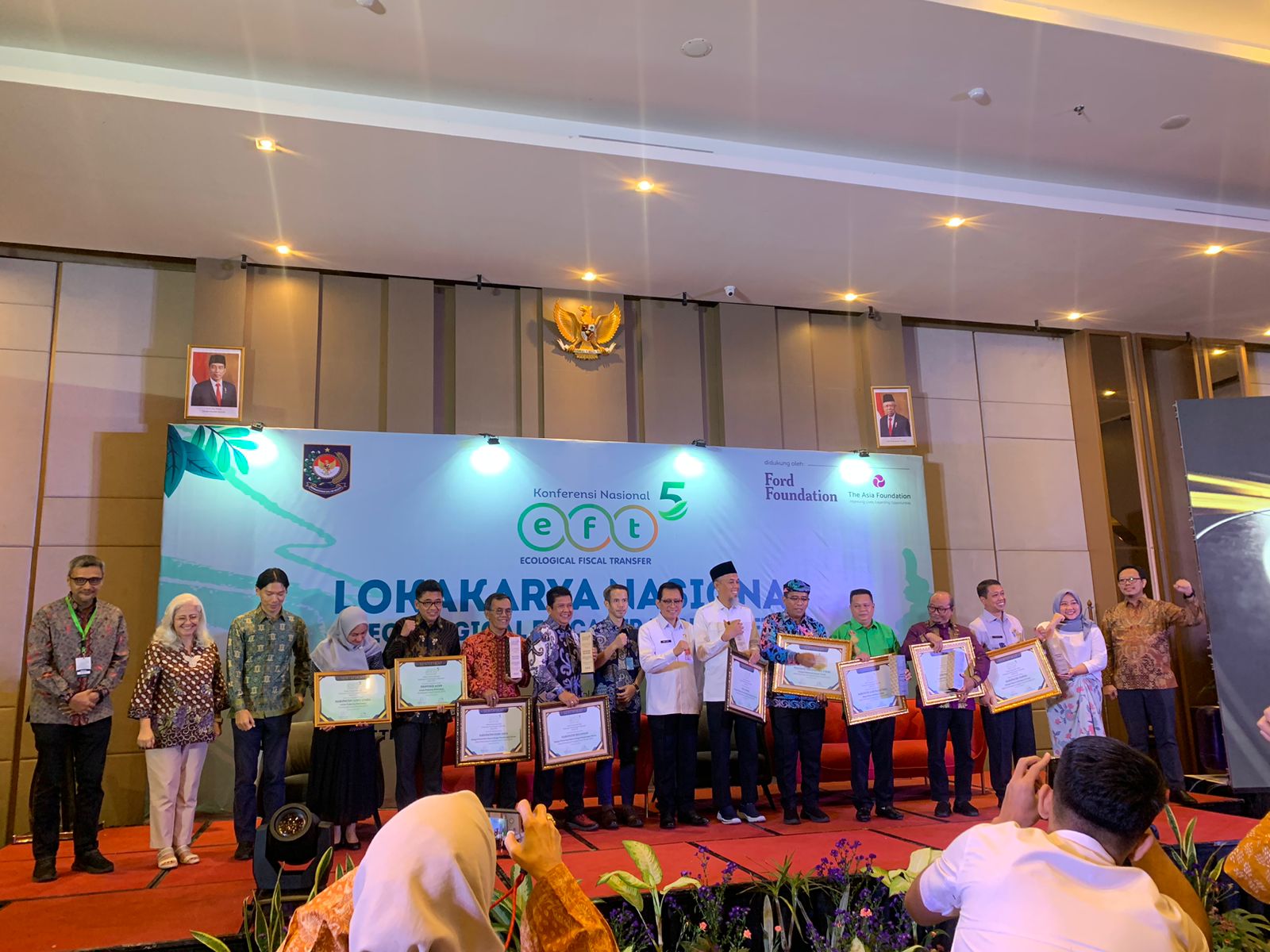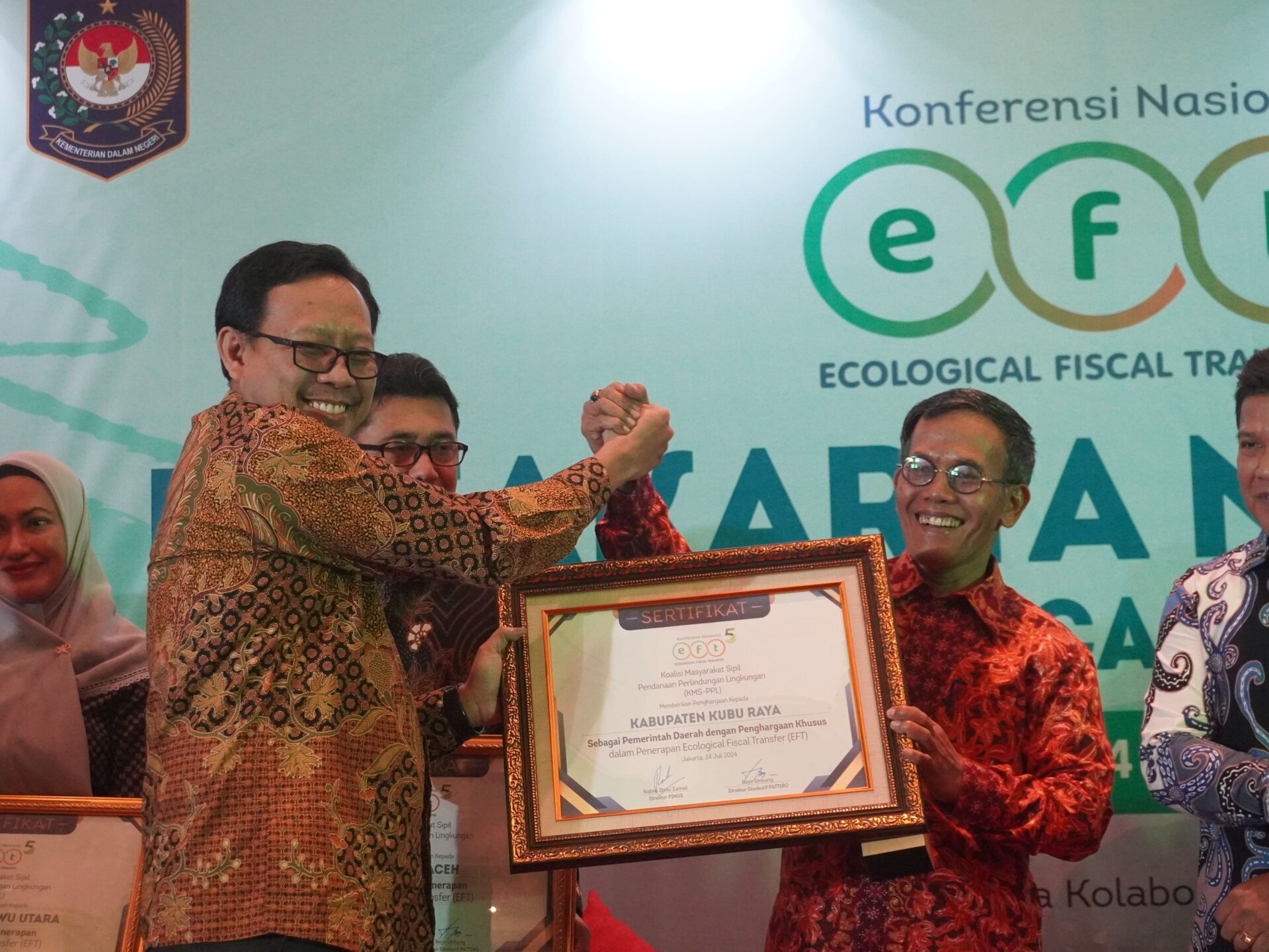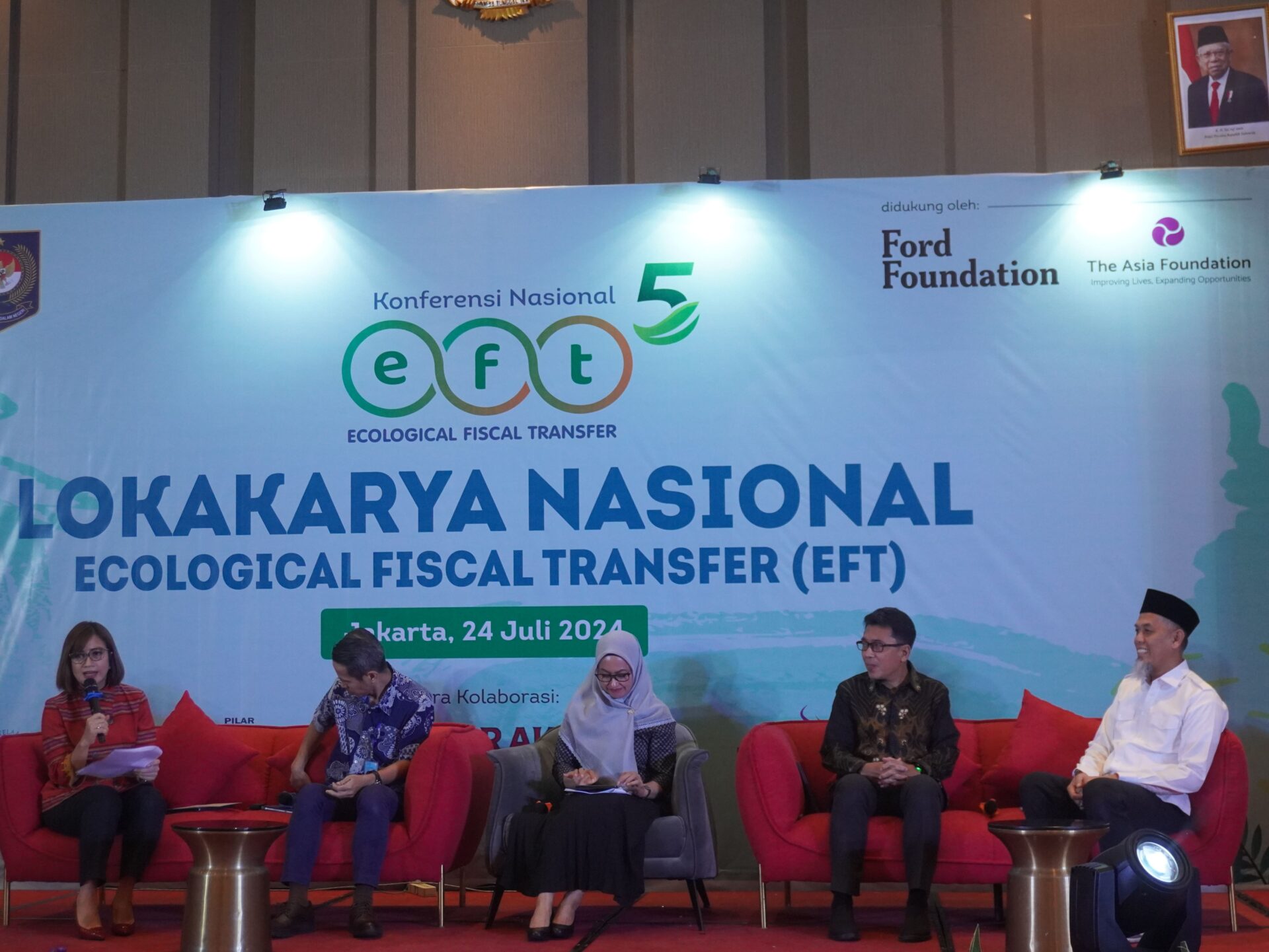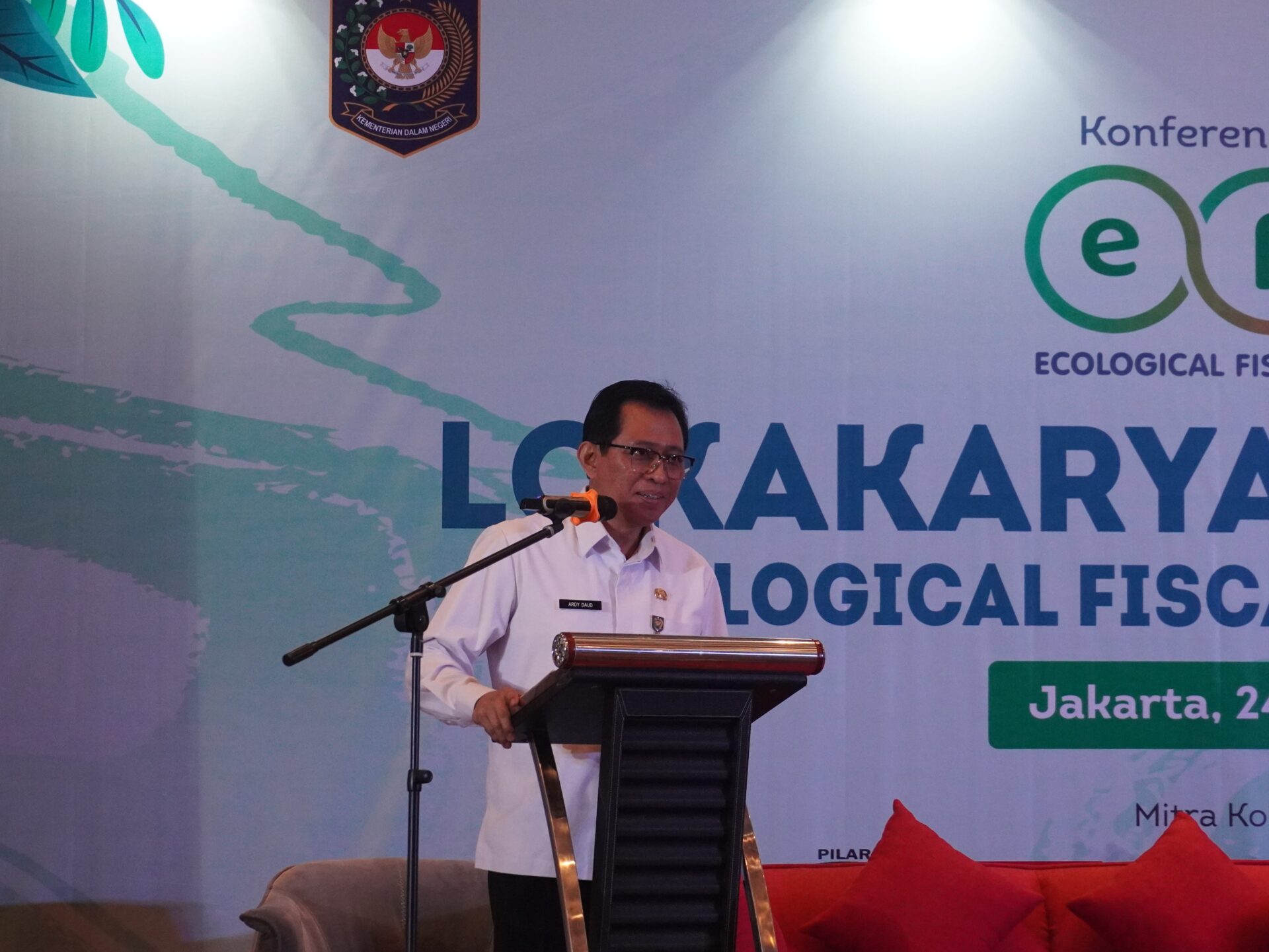The Civil Society Coalition for Environmental Protection Funding (KMS-PPL) is proud to announce the successful implementation of the National Ecological Fiscal Transfer (EFT) Workshop, as part of the 5th EFT National Conference – 2024. This event was organized with the support of the Ministry of Home Affairs, the Ford Foundation, and The Asia Foundation. Active members of KMS-PPL include Pilar Nusantara (PINUS), the Center for Regional Studies and Information (PATTIRO), the Indonesia Budget Center (IBC), the Aceh Anti-Corruption Movement (GeRAK), the Indonesian Forum for Budget Transparency (FITRA) Riau, JARI Indonesia Borneo Barat, and Sikola Mombine.
This workshop became a forum for discussion and evaluation of the implementation of the EFT scheme as an environmental funding innovation in Indonesia. Since 2017, KMS-PPL has initiated the Ecological Fiscal Transfer (EFT) model as one of the environmental funding innovations in the regions. This fiscal incentive scheme is designed to encourage local governments to pay more attention to environmental conservation and low-carbon development through Ecology-based Provincial Budget Transfer (TAPE), Ecology-based District Budget Transfer (TAKE), and Ecology-based Village Budget Allocation (ALAKE).
To date, 40 local governments have adopted the EFT policy with a total funding of IDR355.4 billion. This fund has benefited 21 districts/cities, 1,518 villages, and 104 villages. The implementation of EFT has proven successful in increasing the allocation of funds for environmental conservation, reducing the incidence of forest and land fires, and encouraging greening programs and ecotourism management that have a positive impact on the local economy.
Gunawan Eko Movianto, Acting Director of SUPD 1, Directorate General of Development of Regional Development, Ministry of Home Affairs, emphasized the importance of ecology-based fund allocation in encouraging ecological management and conservation in the regions. “The adoption of EFT not only has a positive impact on the environment but also on regional governance and gender mainstreaming,” said Gunawan.
The adoption of the EFT scheme in this environmental protection funding policy not only has a positive impact on environmental protection in the region, but also on regional governance and gender mainstreaming in the region.
Dedy Fahrian, Bappeda Aceh, explained that in Aceh Province, the adoption of the TAPE scheme was carried out through the Special Financial Assistance scheme from the Provincial Government to the Regency Government. This scheme aims to encourage the performance of the Regency/City government in sustainable environmental management. Not only taking into account environmental indicators, but the Aceh Province TAPE assessment instrument also takes into account gender mainstreaming indicators.
No less than Aceh Province, Indah Putri Indriani, Regent of North Luwuk, said that in addition to integrating gender-responsive policies in the implementation of TAKE, North Luwu Regency also added the Village Development Index (IDM) indicator of 60% and Sustainable Village (SDGs Village) of 40% to the Village Performance Allocation for the reformulation of the allocation of Village Fund Allocation (ADD). The TAKE scheme makes North Luwuk Regency have an increase in the Village Development Index for Independent Villages, including the highest in South Sulawesi.
The EFT scheme is also applied at the village level. Paisal, the Mayor of Dumai, explained that the ALAKE scheme is part of the Village Fund distributed by the Dumai City Government based on the assessment of the environmental/ecological performance of each village. The ALAKE scheme in Dumai City has resulted in a city that is clean from waste because it motivates villages to fix waste in the city.
Challenges and Policy Recommendations
However, the implementation of EFT still faces several challenges. KMS-PPL, supported by the Ford Foundation and The Asia Foundation, recommends several strategic steps to strengthen and expand the implementation of this policy:
- Expanding adoption and institutionalization of EFT in national and subnational policies.
- Integrating EFT into regional planning and development documents.
- Incorporating gender and social inclusion indicators into EFT performance assessments.
- Increasing legislative support to oversee EFT policy regulations in Indonesia.
The Future of EFT Policy in Indonesia
The EFT policy has paved the way for a new direction in intergovernmental financial transfer policy, especially with the enactment of Law Number 1 of 2022 concerning Financial Relations between the Central Government and Regional Governments (HKPD Law) and Government Regulation Number 1 of 2024 concerning Harmonization of National Fiscal Policy. These two regulations provide a strong foundation for the implementation of fair, transparent, and accountable ecological-based performance incentives.
Restuardy Daud, Director General of Regional Development, stated that the EFT concept has been implemented globally in several countries. The hope is that this concept can continue to be developed in Indonesia as a clear and measurable instrument for fund allocation. “Local governments when providing financial assistance to the government hierarchy below them often do not have clear enough instruments to provide measurable assistance. The EFT concept can be an alternative to overcome this,” said Restuardy.
 KMS-PPL Award for Local Government in EFT Implementation
KMS-PPL Award for Local Government in EFT Implementation
At this event, KMS-PPL gave three categories of awards to local governments in the implementation and development of the TAPE/TAKE/ALAKE scheme in their regional financial policies.
The three categories are:
- General awards as a form of appreciation to 40 regions that have adopted policies and/or implemented EFT. These regions are: North Kalimantan Province, Aceh Province, West Nusa Tenggara Province, East Nusa Tenggara Province, Central Kalimantan Province, Kab. Really Meriah, Kab. Southwest Aceh, Sabang City, Kab. Siak, Kab. Bengkalis, Kab. Pelalawan, Kab. Rokan Hulu, Kab. Merangin, Kab. Musi Banyuasin, Kab. Karimun, Kab. Cirebon, Kab. Trenggalek, Kab. Banyuwangi, Kab. Kubu Raya, Kab. Sanggau, Kab. Mempawah, Kab. Seruyan, Kab. Pulang Pisau, Kab. Barito Kuala, Kab. Balangan, Kab. Berau, Kab. Nunukan, Kab. Bulungan, Kab. Tana Tidung, Kab. Central Lombok, Kab. Sigi, Kab. Toli-Toli, Kab. Maros, Kab. Pangkajene Islands (Pangkep), Kab. North Luwu, Kab. Southeast Maluku, Kab. Jayapura, Pare-Pare City, Palu City, and Dumai City.
- Special Awards which were given to three regional governments, namely Kubu Raya Regency, Bulungan Regency, and Dumai City.
- Kubu Raya Regency has the uniqueness of being the first region to integrate gender and social inclusion indicators in the TAKE calculation which still persists today, as well as EFT which supports the reduction of critical land and strengthening sustainable economic innovation through BUMDes village tourism, development of access and social forestry efforts, and utilization of natural resources that have been wasted/unused to become superior village products.
- Bulungan Regency is a region that develops EFT independently and innovatively. Implementing a technology-based performance assessment system for transparency and accountability.
- Dumai City has a special status as a new pioneer area in the implementation of the ALAKE scheme, with a high budget allocation commitment, which is integrated into regional development planning.
- Best Local Government Award which was given to the four best regional governments in implementing EFT 2024, namely North Kalimantan Province, Southwest Aceh Regency, Siak Regency, and Maros Regency. These four regions are considered to have consistently implemented and synergized EFT in regional strategic policies. There is also an increase in the allocation of EFT each year and uses different funding sources. These four regions apply varied and gender-responsive EFT indicators. The assessment system carried out by these four regions is transparent and easily accessible by regions and/or villages. The implementation of EFT in these four regions has a significant impact on efforts to improve and/or enhance environmental protection and community welfare.







